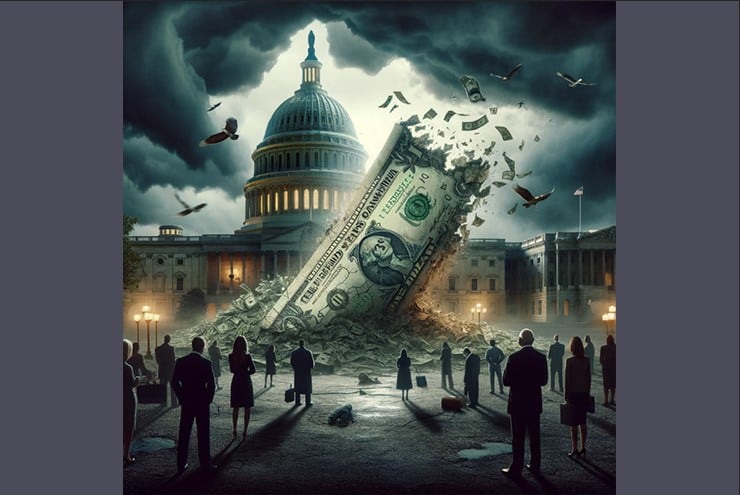The Canadian province of Saskatchewan in February ordered its utility company to stop levying a carbon tax imposed by Canada’s national government in order to reduce the financial burden on its citizens. Prime Minister Justin Trudeau’s administration has vowed to take legal action against the rebelling province. Saskatchewan’s tax rebellion is likely a sign of things to come in the United States, as federal tax policy has become so abusive and arbitrary that state governments may intervene to provide relief.
In a scenario that might resemble the plot of the recent movie Civil War, one can imagine strange alliances forming between blocks of states that otherwise have very different agendas. A great unraveling of the United States is not as far-fetched as one may think.
The U.S. government’s $34 trillion of debt grows by approximately $1 trillion every 100 days. As the debt and the interest payments grow, America’s fiscal situation continues to deteriorate rapidly. Interest costs alone will soon reach $1 trillion per year and very well could double. The deeper the federal government sinks into debt, the higher the interest rate it must pay to borrow money to cover its debt payments. It won’t be too many more years before all the taxes collected won’t be enough to pay just the interest on the debt.
At some point, the U.S. Treasury will become little more than a clearinghouse for bond payments. Historically, regimes in this much financial trouble use inflation to devalue their entitlement and public salary obligations. Except for the essential personnel needed to maintain power—police and the military—other aspects of administration will go without. Should we reach this point, one can imagine a conversation among the leadership of the largest states (California, Florida, Texas) in which the Saskatchewan option might be discussed.
Sending more money to Washington, in this scenario, will result in no benefit to those regions. Washington will deliver every penny sent to them towards keeping bondholders at bay and propping up its own power. Nothing will come back to the states. Why would states tolerate this for very long? Why allow those dollars to leave in the first place?
States have already demonstrated the ability to defy federal law without consequence. So-called “sanctuary cities” and local marijuana reform have “legalized” things that the Constitution does not give states the power over. Yet the federal government shrank from enforcing its superiority in these areas when states stood up to federal government.
In the Saskatchewan scenario, local authorities outlawed remittances to the federal government. In the U.S., state governments may try to divert some federal taxes to their own coffers, while some may simply be left in the hands of the long-abused taxpayers as tax relief. The Biden administration’s current proposal to tax 25 percent of unrealized gains on businesses is exactly the kind of abuse that, if passed, may spur taxpayers to revolt. Such a policy would force most small businesses to sell huge shares of ownership to fund the tax. In practical application, it would amount to a communist-style nationalization of huge swaths of private business. These coerced sales would wipe out generational wealth and destroy healthy businesses. It would allow hedge funds and central banks to scoop up an ever-larger share of the independent economy.
Tax collection, particularly at the federal level, largely relies on voluntary compliance. The IRS’s tax enforcement resources are only sufficient to address a few stragglers and cheats. If an entire state were to just stop collecting federal taxes, it would quickly overwhelm the system. The unraveling would happen quickly after that. Bond markets would immediately demand higher yields to address the impaired tax base. Taxpayers in the other states would have to share a larger burden unless they, too, revolted.
The precipice is coming into view as this scenario becomes more likely. The federal government will unravel if it doesn’t correct course. Any course correction will begin and end with one simple change: The government needs to cut its spending drastically by relinquishing all its noncore roles.
Consider another revolution taking place, in Argentina, where the new president is slashing public spending—leading to lower inflation and a budget surplus. It’s really that simple. The United States federal government spends a lot of money on things that do not fall into its sphere of core responsibilities. While a prosperous economy can absorb a lot of waste, our government is clearly living beyond its means. It can’t go on forever and so it won’t.



Leave a Reply